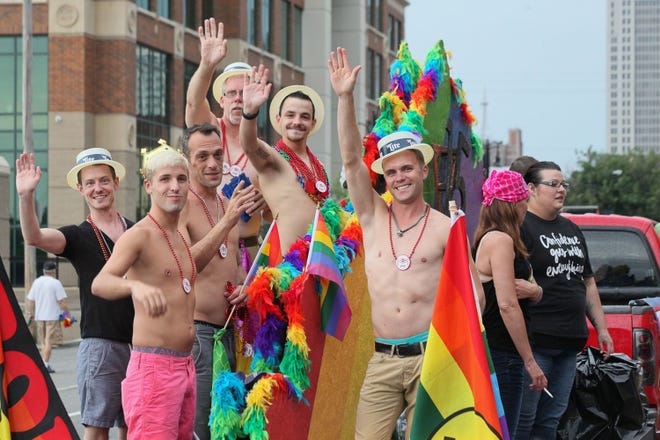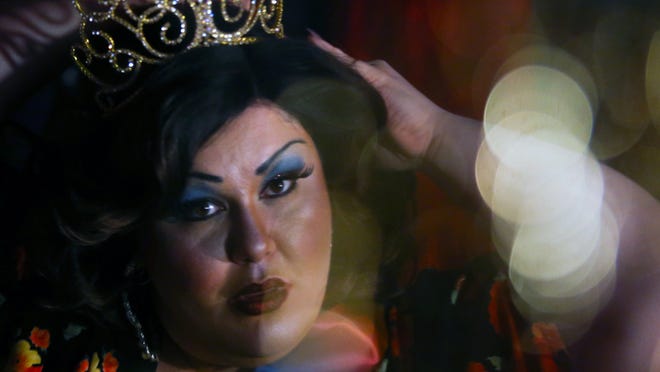In the days leading up to Christmas, Mike Flatt and his staff would wrap hundreds of presents for the customers at Tryangles.
The bar owner knew many of them didn’t have a home they were welcome to for the holidays.
So in many ways, the recently shuttered Louisville gay bar became their home.
That meant at Christmastime, everyone walked out of the bar with armfuls of gifts, and on Thanksgiving, people packed into the bar for a full turkey dinner. When the bar opened in the early 90s, fewer families embraced gay men and their partners. Going home to mom and dad meant his customers often had to pretend to be someone they weren’t around the dinner table or the men they loved weren’t invited. So Flatt decked the halls and threw the best celebration he could.
Acceptance of the LGBTQ community isn’t universal today, but it has certainly has grown. That means that while there are more inclusive and safe spaces around the city for the LGBTQ community it creates a sort of loss for places like Tryangles that traditionally cater to a specifically gay crowd.
Flatt saw the downtickin customers over the years as his Thanksgiving table thinned out and his clientele grew more comfortable in mainstream bars.

Today gay men have so many other places they can go, Flatt toldme when I met him on a Southern Indiana porch in late June, about a month after Tryangles shut its doors for goodat 209 S. Preston St. They can walk comfortably into any bar on Bardstown Road or in downtown Louisville.
That’s a beautiful, but difficult, problem for anyone who owns a traditional gay bar, he said.
Tryangles hadn’t really made money in about 12 years, Flatt told me. After nearly three decades in business, the bar couldn’t sustain itself any longer.
You may like:From Oscar Wilde to same-sex marriage, here’s a timeline of Louisville’s LGBTQ history
Flatt’s since moved to Mexico, but I hadn’t tracked himdown during a recent trip back to town to talk about the downslide. When the bar closed in May, it was the longest consistently operating gay bar in Louisville and an institution for the LGBTQ community. So in tribute, I spent some timeafter the closure chatting with the people who were instrumental in Tryangles’ heyday.
Flatt was candid with me when we met. He’s never been a drinker and the whole “owning a bar” thing started as a fluke.
Flatt purchased his original bar, Teddy Bears at 1148 Garvin Place, on a whim for $2,700 in 1987. The previous owner needed cash fast, and Flatt had a wad of it in his pocket because he used to purchase antique paintings.

He didn’t know anything about drinking culture or running a bar, he told me, but he figured he could sling beer. He was right, and about seven years later, that success expanded to a second bar with Tryangles.
Flatt enlisted Teddy Bears’ bartender, Richard McLargin Jr., better known among guests as “Turtle,” to run the buildout at Tryangles. They left him “a lot of wood and a lot of money” and from that, he created a country western-themed bar complete with a corral-like dance floor, front porches and bar that was supposed to feel like the center of town.
The focal point was a saddle adorned with a mosaic of tiny mirrors to make it look like a disco ball.
“It was beautiful, and it was sharp as hell,” McLargin remembered, as he described getting it up on the wall.
Tryangles was supposed to open April 1, 1994, he remembered, but that was pushed back. When the carpeting showed up just days before opening, it was pink — and it wasn’t supposed to be pink.
“Don’t look outside,” McLargin remembers telling Flatt and his partner, Charles Baker Sr.
“It’s a gay bar isn’t it?” the carpet company told McLargin, which infuriated everyone involved.
Black carpet was installed instead and Tryangles opened a week later.
Out of the shadows: Why these people are uncovering Louisville’s storied LGBTQ history

The backroom evolved as the bar did, Flatt remembers. Connections, at nearby 120 S. Floyd St. was the popular place to dance, so eventually, they reimagined that corral and brought in male strippers instead.
They were high-energy, talented straight boys, who were putting themselves through the University of Louisville.
One went on to become a doctor and another has since earned a top position at a large Louisville company, Flatt said, speaking proudly of them and also carefully to avoid outing their dancing past.
Privacy, as you can imagine, is essentialfor many in the LGBTQ community.
That’s part of the reason there are no 27-year-old photos of the nightlife attached to this column. Pictures of the early days of Tryangles are exceptionally hard to come by.
Flatt didn’t have any of the interior on hand, and even as we scrolled through the shuttered bar’s Facebook page, he was respectful ofthe bar’s clientele. He spent nearly three decades protecting his family. That wasn’t going to stop now that the doors had closed.
Darrell Robinson, a retired drag queen known as Cissy Blake, told me that he always felt like a part of that family. Walking into Tryangles was like walking into that bar from the sitcom “Cheers.” The bartenders knew his drink, which was vodka, soda and a splash of orange juice. He had hisown stool and he spent most afternoons at Tryangles during happy hour. For a brief period, he ran karaoke for the bar, which filled Tryangles with endlessshow tunes and Elvis Presley songs.
It was the kind of place that if you walked in as a stranger, you didn’t stay a stranger for long.
Read this:It’s Pride Month! Here are 7+ things to do around Louisville to support the LGBTQ community

Robinson, who was one of the first publicly HIV-positive people in Louisville, remembers having young gay men come up to him at the bar, pull him aside and confide their own status to him. During his own journey, he dropped down to 133 pounds and his outlook got so dark his family put a marker down on his grave plot.
“If I can pull out of it, you can pull out of it,” he’d tell the frightened men at the bar, trying to be the moment of light they were seeking.
In so many cases, Tryangles had been his family, particularly as his own family started passing. He wanted to be that for other people, too.
The warmness that you felt when you walked into the bar was really what set it apart from its competitors, Robinson told me.
That was theattitude that Flatt insisted upon, and it was part of the reason he named his first bar Teddy Bears. He didn’t want anyone to walk into his business without getting a hug. He tried to keep the bar from becoming clique-ish. The people who came to his bar were his friends. They didn’t just buy drinks from him. Flatt invited many of them out to his home in Southern Indiana and for day trips on his boat. When they hit hard times often he paid their water or electric bill.

He tried to build a culture of love and acceptance for people, who often, never felt it anywhere else.
Eventually, though, Flatt’s health dwindled, and about 13 years ago, he started splitting his time between Louisville and Mexico. He held onto the building, but he turned over the business to the son that he and Baker raised together. As the bar struggled and finances dwindled, selling the building became necessary.
Related:For Pride Month, here are some of our favorite LGBTQIA+, inclusive bars in Louisville
He’s proud the LGBTQ community’s place in this city has evolved so much that his family is comfortable wherever they want to go.
It hurt, though, watching the bar close. It was like losing a piece of himself.
That doesn’t change what the space meant to him for 27 years. As he spoke about what he created, his smile was as striking as that sharp, beautiful mirrored saddle.
“I had fun,” he told me. “That was the main thing, I had fun. No matter where I went, I wanted people to have fun and that’s the way I’ve lived my life. Trying to make sure everyone had a smile on their face.”
Features columnist Maggie Menderski can be reached at mmenderski@courier-journal.com.
